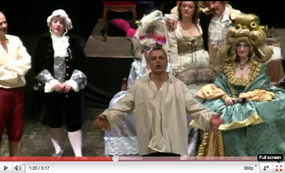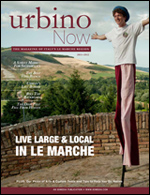URBINO, Italy – In the college town of Urbino, the new and old clash together everywhere you look – quaint grandparents and rowdy students gather together in the Piazza; modern construction cranes tower over centuries-old churches, and hybrid vehicles roll through cobblestone streets made for horses. In this eternal juxtaposition between youth and history, one man fights for the side of history with the best weapon he knows – art.
Duccio Marchi, born in Urbino in 1958, is one of the last speakers of Dialetto Urbinate, the historic language of the area. Though Italy’s many dialects were officially replaced by the literary Tuscan dialect after the national unification of Italy in the 1860s, local dialects were still used in everyday speech until the adoption of television in the 1960s. But Duccio doesn’t just speak Dialetto Urbinate – he writes his music in it.
 “I’ve been writing songs in Italian for 30 years,” Duccio says from an outdoor table at the Bar Del Teatro, or Theater Bar, which is nestled in the side of Urbino’s main performance center. “And in dialect for 10 years.” At 53, his sunken eyes speak of experience, though it is easy to tell he is in excellent physical shape for his age.
“I’ve been writing songs in Italian for 30 years,” Duccio says from an outdoor table at the Bar Del Teatro, or Theater Bar, which is nestled in the side of Urbino’s main performance center. “And in dialect for 10 years.” At 53, his sunken eyes speak of experience, though it is easy to tell he is in excellent physical shape for his age.
People find it hard to understand that in dialect, you can express more things than in Italian.
Italian Dialects, or Regional Italian, are variations of the Italian language which were spoken until modern Italian gradually became the standard language throughout the nation in the mid-20th century. But a national standardized language also has its drawbacks.
“People find it hard to understand that in dialect, you can express more things than in Italian” Duccio says. “The schools, for a lot of years, especially in the ’60s, ’70s, and ’80s, said that dialect wasn’t Italian language – it was something different. So they told people not to speak it.”
Duccio admits that dialect throughout the country won’t be around forever. “Yes, I think that it is going toward extinction simply because there are just a few people who speak it. I’m the only one to write songs in Dialetto Urbinate, though people write in dialect in Rome, Naples, Milan; big cities like that.” But he is also hopeful that his language will last longer than he will. “I think that my songs are everlasting. I think and I hope so” he says.
But Duccio’s songs are not simply written in the dialect of the area – they are intrinsically intertwined with Urbino itself. “My songs talk about the city, the streets, the places, but also the people” he says. As an example, Duccio mentions a song about selfish landlords here in the walled city, renting apartments to students at exorbitant prices. Though he speaks about his song with a lighthearted laugh, you can see the seriousness in his eyes. “I sing about things concerning these people and this place.”
Urbino, considered the worldwide center of cultural civilization during the renaissance period, has since morphed into a city of disposable youth. A majority of the citizens inside the city walls are students, studying at the University of Urbino, who take up residency until graduation – usually a mere 3 years. “Inside the actual city walls, there are maybe only 15 or 20 local families left,” said Dr. Eduardo Fischera, who has lived in Urbino for a majority of his life. “The rest are students who rent out apartments.”
Fabio Massaro, 19, studies language at the University of Urbino. “I don’t use dialect often, only sometimes when talking about home” he says. “But we do have cheers, or songs, that we still chant. We had a cheer in dialect that we yelled at my brother’s graduation last week.”
When asked about what the students think of his music, Duccio is convincingly optimistic. “Yes, I think they like this kind of music. They started using instruments again that they haven’t used for a long time. Music is becoming more appreciated by the young people.”
Duccio can claim undisputed credit for at least three young people’s love of music. “I have three sons, big sons, and I always sing in dialect to them,” he says with a smile on his face. “One studies in New York, and when we meet on Skype, we play something together in dialect.”
Duccio is somewhat of a local celebrity here in Urbino – most of the locals know his name, and many have seen him perform. But when asked about his fans, he is quick to mention that he isn’t in is for fame or money. “I don’t care if I become famous or not, I just like singing” he says.
The singer doesn’t have to worry about his music paying the bills, though. A man of many trades, he is a family doctor at the area’s hospital. Besides working and singing, Duccio still finds time to perform in the local theater – always in dialect, of course.
“Italian theater has it’s origin in dialect theater. We use the dialect to make people laugh. The dialect itself makes people laugh” Duccio says. He performs classic comedic musicals, complete with harpsichord accompaniment and renaissance-style outfits. The scripts talk about timeless Urbino landmarks, such as the piazza and basilica.
“Right now I’m working on a text from 1513. I’m translating it into dialect, and we will be performing it in a year.” The 500 year old production was performed in the Palazzo Ducale in the early 16th century, and now, half a millennia later, is being revived by Duccio. He offers me an invitation to some see the play – if I happen find myself in town next summer, that is.
